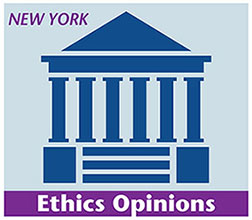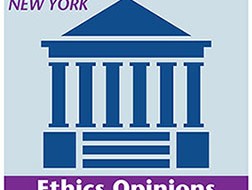Recent N.Y. Ethics Opinions: October 2016
By Tyler Maulsby, Associate, Frankfurt Kurnit Klein & Selz
Here are summaries of ethics opinions issued January, February, and August 2016. The opinions were issued by the NYSBA Committee on Professional Ethics and the NYC Bar Association Committee on Professional Ethics. NYLER will continue to provide updates on new ethics opinions issued by these and other ethics committees in New York State.
For information about how to obtain an ethics opinion from the NYS Bar Association Committee on Professional Ethics, please visit http://www.nysba.org/Ethics/.
For information about how to obtain an ethics opinion from the NYC Bar Association Committee on Professional Ethics, please visit http://www.nycbar.org/member-and-career-services/committees/.
NEW YORK STATE BAR ASSOCIATION OPINIONS
NYSBA Ethics Op. 1083 (Jan. 2016)
Conflicts of Interest and Ancillary Businesses
In Opinion 1083, a lawyer whose firm represented a number of nursing homes, sought to create a non-profit organization for the purpose of accepting judicial appointments of low-asset nursing home residents who are incapacitated and in need of assistance. The Opinion addressed whether the lawyer’s firm could, in certain situations, represent both the nursing home and the nonprofit organization without creating an impermissible conflict of interest. The Opinion assumed that both the nursing home and the nonprofit were “continuing clients” of the firm, meaning that both would be considered “current clients” of the firm. Therefore, the Opinion reasoned, any conflict analysis would be governed by Rule 1.7 of the New York Rules of Professional Conduct (Rules). Under Rule 1.7, the law firm could not represent both the nonprofit and the nursing home if the representation would (i) involve the law firm representing “differing interests” or (ii) if there was a significant risk that the lawyer’s professional judgment on behalf of either client would be adversely impacted by the lawyer’s own “financial, business, property or other personal interests.” Under Rule 1.0(f), “differing interests” are any interest that would “adversely affect either the judgment or loyalty of a lawyer to a client.” Additionally, if any one lawyer in the law firm had an impermissible conflict of interest under Rule 1.7, that conflict would be imputed to the entire firm under Rule 1.10. With respect to the corporate formation of the nonprofit, the Opinion concluded that “the law firm is acting on its own and not on behalf of a client. Consequently, the terms of Rule 1.7(a)(1) and 1.9 do not apply.” Thus, provided the lawyer did not have a “personal interest” conflict under Rule 1.7(a)(2), there would not be an ethical bar that would prohibit the lawyer or the firm from forming the nonprofit. The Opinion noted, however, that certain conflicts may arise if the law firm represented the nonprofit concurrently with the nursing home in matters where the nonprofit had been appointed guardian for nursing home residents. For instance, if the nonprofit were appointed to manage the property of the nursing home resident, then the firm could may run the risk of representing clients with “differing interest” since, in that situation, the nursing home client and the nursing home as an entity may have differing financial interests. Similarly, the Opinion reasoned, issues involving quality of care or treatment in the representation “are more likely to involve differing interests between the guardian, which must exercise the utmost degree of trust, loyalty and fidelity in relation to the incapacitated person, and the law firm’s nursing home client.” Finally, the Opinion concluded that in certain instances both clients could consent to the conflict of interest as long as the matter did not involve a claim by one client against another client or was otherwise prohibited by law.
The full Opinion is available at: http://www.nysba.org/CustomTemplates/Content.aspx?id=62008.
NYSBA Ethics Op. 1084 (Jan. 2016)
Revealing Confidential Information After a Client’s Death
In Opinion 1084 a criminal defense attorney who represented a client charged with fraud learned information during the representation of a client that seemed to exonerate a co-defendant in the case. The attorney’s client was convicted and subsequently died, however, before the client’s death, the client told the attorney that if he (the client) was convicted, he wanted to exonerate his co-defendant. The Opinion first concluded that the information at issue was “Confidential Information” within the meaning of Rule 1.6. The Opinion reasoned that the lawyer could not disclose the information absent express or implied authorization. Since the deceased client was a former client, the lawyer’s obligations were governed by Rule 1.9(c), which provides that a lawyer may not “reveal confidential information of the former client protected by Rule 1.6 except as [the] Rules would permit or require with respect to a current client.” The Opinion then addressed whether the lawyer was authorized under the Rules to disclose the confidential information at issue. The Opinion concluded that whether the client expressly authorized the lawyer to disclose the information “was a question of fact beyond the jurisdiction of this Committee to resolve.” If, however, the client gave such express authorization under circumstances that would constitute “informed consent” as required by Rule 1.6(a)(1), then the lawyer would be expressly authorized to make the disclosure. Additionally, the Opinion concluded, “where there is reason to believe that the now-deceased client would have wanted the co-defendant to be exonerated under the current circumstances, the concept of implied authorization to disclose in Rule 1.6(a)(2) would permit the lawyer to make such disclosures as may be necessary to accomplish that end.”
The full Opinion is available at: http://www.nysba.org/CustomTemplates/Content.aspx?id=62009.
NYSBA Ethics Op. 1085 (Feb. 2016)
The Continuing Duty to Conduct Conflict Checks
Opinion 1085 addressed whether a law school clinic had an ongoing obligation to conduct a conflict check when it learned of new information about potentially adverse persons. In Opinion 1085, a law school clinic intended to seek post-conviction relief for a client who was a victim of human trafficking. As part of the post-conviction relief petition, the clinic intended to include information about the client’s alleged traffickers that it learned through investigation. The clinic did not have the legal names of the alleged traffickers but only the “street names” and general areas of residence. The clinic recognized, however, that naming a person (even by a “street name”) as a trafficker had potential adverse consequences for that person. The clinic therefore inquired whether it was required to run a conflict check with the names of the alleged traffickers and whether it was required to supplement the conflict check if and when it learned of new identifying information about the alleged traffickers. The Opinion observed that a lawyer’s duty to search for conflicts was contained in Rule 1.10(e). Under Rule 1.10(e), a firm must check for conflicts when: “(1) the firm agrees to represent a new client; (2) the firm agrees to represent an existing client in a new matter; (3) the firm hires or associates with another lawyer; or (4) an additional party is named or appears in a pending matter.” Quoting Comment [9] to Rule 1.10, the Opinion reasoned that the purpose of the conflict checking requirement is to “render effective assistance to lawyers in the firm in avoiding conflicts of interest… .” The Opinion concluded, therefore, that while the clinic did have an obligation to perform a conflict check at the outset of the matter, “the acquisition of new information during the course of the representation” is not one of the four triggering events delineated in Rule 1.10(e). Additionally, the Opinion noted that an alleged trafficker would not be an “additional party” in the context of the post-conviction petition. The Opinion suggested, however, that supplementing the conflict check with new information learned about the alleged traffickers “may be advisable” in order to minimize the risk of ethical problems and also for the clinic “to discharge its own responsibility to help those lawyers avoid such conflicts.”
The full Opinion is available at: http://www.nysba.org/CustomTemplates/Content.aspx?id=62010.
NEW YORK CITY BAR ASSOCIATION OPINIONS
N.Y. City Ethics Op. 2016-3 (Aug. 2016)
Prosecutors’ Ethical Obligations to Disclose Information Favorable to the Defense
Under Rule 3.8(b), prosecutors must “timely disclose[]” evidence that is “favorable” to the accused. Opinion 2016-3 addressed two main questions related to prosecutors’ ethical disclosure obligations: (1) Does Rule 3.8(b) require a prosecutor to disclose information that is not necessarily “material” and would otherwise likely not need to be disclosed under relevant state and federal constitutional decisions; and (2) what constitutes “timely disclosure” under Rule 3.8(b). With regard to the first question, the Opinion concluded that “[w]hile Brady has been held to require a prosecutor to disclose only ‘material’ evidence favorable to the accused, Rule 3.8 on its face is not subject to the same materiality limitation.” The Opinion based its conclusion on the history and text of Rule 3.8(b) as well as authorities from other jurisdictions that have interpreted similar rules. Analyzing the text of New York Rule 3.8(b) as well as its analogue in the ABA Model Rules, the Opinion concluded that both rules “were not simply codifications of evolving constitutional requirements and, in particular, did not include a materiality requirement.” Instead, the Opinion reasoned that prosecutors’ ethical and legal obligations “are intended to augment one another.” The Opinion also concluded that Rule 3.8(b) does not require prosecutors to conduct an investigation to uncover information that may be covered by Rule 3.8(b), which is contrary to a prosecutor’s Brady obligation. The Opinion reasoned that in this respect Rule 3.8(b) is “less demanding than applicable legal disclosure obligations,” which further supports the conclusion that Rule 3.8(b) and a prosecutor’s Brady obligation are not coextensive. With regard to 3.8(b)’s “timeliness” requirement, the Opinion concluded that “once a prosecutor knows of evidence and information that tends to negate the guilt of the accused, or that otherwise falls within the rule’s disclosure requirement, the prosecutor ordinarily must disclose it as soon as reasonably practicable.” This is so because the “purpose of disclosure ordinarily includes not only facilitating a potential trial defense but also assisting the defense prior to trial… .” The Opinion reasoned that “[t]his requirement is consistent with a prosecutor’s role as a “minister of justice and not of simply that an advocate…Where timely disclosure might be harmful — e.g., where it might lead to witness tampering or obstruction of justice — the rule contemplates that the prosecutor may be relieved of the responsibility to make timely disclosure ‘by a protective order of a tribunal.’ ” The Opinion noted that it did not attempt to identify when “favorable” evidence or information may not be covered by Rule 3.8(b) because that information does not “tend to negate the guilt of the accused.”
The full Opinion is available at: http://www.nycbar.org/member-and-career-services/committees/reports-listing/reports/detail/formal-opinion-2016-3-prosecutors-ethical-obligations-to-disclose-information-favorable-to-the-defense.
Get CLE Credit for this month’s articles (October 2016).
DISCLAIMER: This article provides general coverage of its subject area and is presented to the reader for informational purposes only with the understanding that the laws governing legal ethics and professional responsibility are always changing. The information in this article is not a substitute for legal advice and may not be suitable in a particular situation. Consult your attorney for legal advice. New York Legal Ethics Reporter provides this article with the understanding that neither New York Legal Ethics Reporter LLC, nor Frankfurt Kurnit Klein & Selz, nor Hofstra University, nor their representatives, nor any of the authors are engaged herein in rendering legal advice. New York Legal Ethics Reporter LLC, Frankfurt Kurnit Klein & Selz, Hofstra University, their representatives, and the authors shall not be liable for any damages resulting from any error, inaccuracy, or omission.
Related Posts
« How to Lose Your Legal Fee, Part 2: Legal Fee Forfeiture Why the “Stock” Decision Is Wrong — And Why It Is Right »







